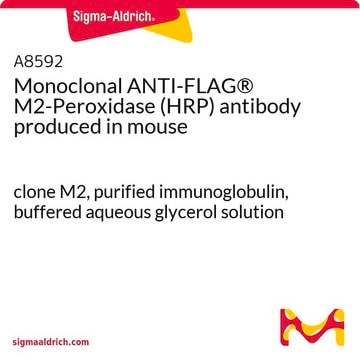A2582
Anti-Thioredoxin–Agarose antibody produced in rabbit
IgG fraction of antiserum, PBS suspension
Synonim(y):
Anti-Thioredoxin
About This Item
Polecane produkty
pochodzenie biologiczne
rabbit
Poziom jakości
białko sprzężone
agarose conjugate
forma przeciwciała
IgG fraction of antiserum
rodzaj przeciwciała
primary antibodies
klon
polyclonal
Postać
PBS suspension
masa cząsteczkowa
antigen 11.7 kDa
reaktywność gatunkowa
E. coli
klasy chemiczne analitów
proteins (thioredoxin)
metody
affinity chromatography: suitable
immunoprecipitation (IP): suitable
Warunki transportu
wet ice
temp. przechowywania
2-8°C
docelowa modyfikacja potranslacyjna
unmodified
Szukasz podobnych produktów? Odwiedź Przewodnik dotyczący porównywania produktów
Opis ogólny
Specyficzność
Immunogen
Zastosowanie
Działania biochem./fizjol.
Postać fizyczna
Uwaga dotycząca przygotowania
Oświadczenie o zrzeczeniu się odpowiedzialności
Nie możesz znaleźć właściwego produktu?
Wypróbuj nasz Narzędzie selektora produktów.
Certyfikaty analizy (CoA)
Poszukaj Certyfikaty analizy (CoA), wpisując numer partii/serii produktów. Numery serii i partii można znaleźć na etykiecie produktu po słowach „seria” lub „partia”.
Masz już ten produkt?
Dokumenty związane z niedawno zakupionymi produktami zostały zamieszczone w Bibliotece dokumentów.
Nasz zespół naukowców ma doświadczenie we wszystkich obszarach badań, w tym w naukach przyrodniczych, materiałoznawstwie, syntezie chemicznej, chromatografii, analityce i wielu innych dziedzinach.
Skontaktuj się z zespołem ds. pomocy technicznej






